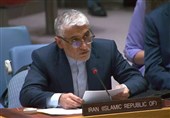Biden Says He Does Not Regret Afghanistan Withdrawal
TEHRAN (Tasnim) – US President Joe Biden on Tuesday said he does not regret his decision to pull US forces out of Afghanistan amid reports of rising civilian casualties as the Taliban make gains in the country.
"We spent over $1 trillion over 20 years. We trained and equipped with modern equipment over 300,000 Afghan forces," Biden said at a news conference. "And Afghan leaders have to come together. We lost thousands, we lost to death and injury, thousands of American personnel. They’ve got to fight for themselves, fight for their nation."
Biden vowed the US would keep its commitments to provide air support, resupply Afghan forces with food and equipment, and pay their salaries.
"But they’ve got to want to fight," Biden added, The Hill reported.
"I think they're beginning to realize they’ve got to come together politically at the top," the president said. "But we’re going to continue to keep our commitment. But I do not regret my decision."
Over the weekend, the Taliban seized a string of provincial capitals, including the strategically and economically important city of Kunduz. The battlefield gains come as the US withdrawal from Afghanistan is largely done, with an official end date set by Biden of Aug. 31.
Using so-called over-the-horizon forces, the US military in recent days has conducted some airstrikes in support of Afghan forces, Pentagon press secretary John Kirby confirmed Monday, but he declined to provide any specifics.
Lawmakers and critics of Biden's decision to withdraw from Afghanistan have raised concerns of the possibility of a full Taliban takeover of the country and the void that could be left without American forces.
The United Nations reported last month that 783 civilians were killed and 1,609 were injured in May and June alone, the highest number of civilian casualties for those two months since tracking began in 2009. And on Monday, UNICEF reported that 27 children had been killed in the last 72 hours.
US administration officials also briefed senators on the situation behind closed doors Monday and faced what Senate Minority Leader Mitch McConnell (R-Ky.) described as “tough” questions.






